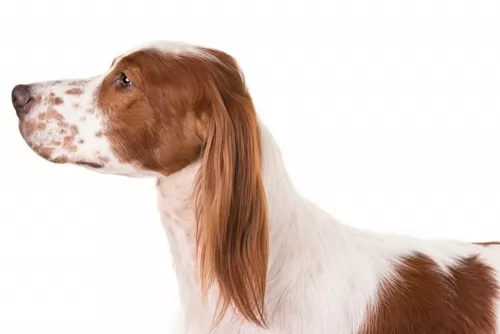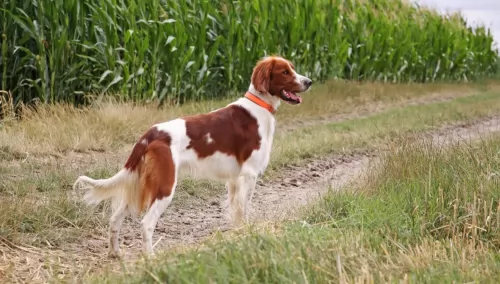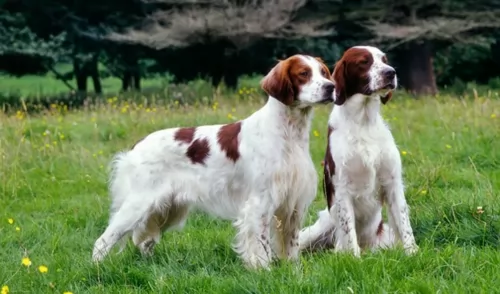 Petzlover
Petzlover Blue Healer is originated from Australia but Irish Red and White Setter is originated from Ireland. Blue Healer may grow 10 cm / 3 inches shorter than Irish Red and White Setter. Blue Healer may weigh 12 kg / 26 pounds lesser than Irish Red and White Setter. Both Blue Healer and Irish Red and White Setter has almost same life span. Blue Healer may have less litter size than Irish Red and White Setter. Blue Healer requires Low Maintenance. But Irish Red and White Setter requires Moderate Maintenance
Blue Healer is originated from Australia but Irish Red and White Setter is originated from Ireland. Blue Healer may grow 10 cm / 3 inches shorter than Irish Red and White Setter. Blue Healer may weigh 12 kg / 26 pounds lesser than Irish Red and White Setter. Both Blue Healer and Irish Red and White Setter has almost same life span. Blue Healer may have less litter size than Irish Red and White Setter. Blue Healer requires Low Maintenance. But Irish Red and White Setter requires Moderate Maintenance
 It was in 1802 that George Hall arrived in New South Wales, establishing 2 cattle stations. He had a problem – getting his thousands of cattle to the Sydney markets. He began looking at the prospect of a droving dog and imported a number of dogs of which a blue mottled dog emerged.
It was in 1802 that George Hall arrived in New South Wales, establishing 2 cattle stations. He had a problem – getting his thousands of cattle to the Sydney markets. He began looking at the prospect of a droving dog and imported a number of dogs of which a blue mottled dog emerged.
The dogs were crossed with dingoes and by 1840 the Halls Heelers were used by the Halls. However with the death of one of the Halls, their cattle stations went to action and the dogs, the Halls Heelers became available.
The dogs attracted attention, and the term ‘Australian Cattle Dog’ was adopted. The name referred to those dogs coming from Thomas Hall's ‘Heelers’. There have been many arguments about the origin of the breed, but the red or blue offspring known as Hall's Heelers were proven cattle drovers, and with further breeding experiments which included the Australian Kelpie, dingoes and the Dalmation, by 1893, the tough, robust working breed known as the Blue Heeler or the Australian Cattle Dog came about.
 Classified as a gun dog in the UK for hunting game birds, and as a sporting dog in the USA, the Irish Red and White Setter was available with his red and white coat. Breeders however, started focusing essentially on the red variety so that the red-and-white setter all but disappeared.
Classified as a gun dog in the UK for hunting game birds, and as a sporting dog in the USA, the Irish Red and White Setter was available with his red and white coat. Breeders however, started focusing essentially on the red variety so that the red-and-white setter all but disappeared.
Fortunately, the breed was revived and considered a separate breed from the Irish Setter. He has gained recognition with all the major kennel clubs.
 Blue Heelers are medium-sized, sturdy, compact dogs who are somewhat longer than tall. The female Blue Heeler measures roughly 43–48cm at the withers, while the male measures about 46–51cm. If your Blue Heeler is in tip top condition, he’ll weigh about 15 to 22 kilograms. They are muscular with pointed, erect ears, dark eyes and long tails which are mostly hanging downwards. Their dense coats are blue- or red speckled and sometimes with tan markings.
Blue Heelers are medium-sized, sturdy, compact dogs who are somewhat longer than tall. The female Blue Heeler measures roughly 43–48cm at the withers, while the male measures about 46–51cm. If your Blue Heeler is in tip top condition, he’ll weigh about 15 to 22 kilograms. They are muscular with pointed, erect ears, dark eyes and long tails which are mostly hanging downwards. Their dense coats are blue- or red speckled and sometimes with tan markings.
The Blue Heeler is a ball of energy and he is clever too. You won’t find him sitting around for too long, and if there is sign of a walk or a ball game, he’s in! He is an independent dog, and although he makes a wonderful family pet, he tends to attach himself to that one special person in his life. He is a natural watchdog and protector of his human family.
 The Irish Red and White Setter is a large dog standing at between 56 – 61cm, both male and female, and weighing at around 25 to 34kg.
The Irish Red and White Setter is a large dog standing at between 56 – 61cm, both male and female, and weighing at around 25 to 34kg.
Always used as a gun dog for its speed and scent, its head is carried high and its long feathery tail is held out level with its back and then it ‘sets’ into a pose, giving its handler a clue where the bird is hiding.
The Irish Red and White Setter has a lean, muscled body which is well proportioned, being slightly more heavily built than the Irish Setter. He also has a broader head.
The coat is shortish but it has those long silky fringes which are known as feathering around the tail, chest and legs. The Irish Red and White Setter is red and white but you may find some freckling around the legs and muzzle. The ears are usually red and they are long, silky and floppy.
As gun dogs, the Irish Red and White Setter is a loyal and devoted family pet who can become a good friend of children too as they love to play. He is a lithe dog and bounding in energy, and he will therefore require a reasonably sized garden.
He will need to be trained and socialized and once trained he makes an obedient and reliable companion.
 Training and socializing of your Blue Heeler will ensure that your dog does what you want him to. The Blue Heeler is an intelligent, responsive dog and training can benefit him, turning him into an outstanding family pet, good with children and other pets in the home.
Training and socializing of your Blue Heeler will ensure that your dog does what you want him to. The Blue Heeler is an intelligent, responsive dog and training can benefit him, turning him into an outstanding family pet, good with children and other pets in the home.
He is a playful, affectionate pet who doesn’t take easily to strangers, and this is what makes him such an excellent guard dog.
Your Blue Heeler is not an apartment dog as he requires a lot of exercise, and cooping him indoors for too long with nothing to do can lead to destructive behavior.
Head-strong, independent and robust, your Blue Heeler will need a firm owner who is boss. Add to the firm owner a lot of love and care, and you’ll have a devoted friend.
 The Irish Red and White Setter is every bit as beautiful as the Red- or Irish Setter even though he may not be as well known.
The Irish Red and White Setter is every bit as beautiful as the Red- or Irish Setter even though he may not be as well known.
Setter lovers are thrilled that this beautiful, playful, well tempered dog has been saved from extinction. He has plenty of stamina to be an excellent sporting dog.
He is intelligent too and easily trained. He is an affectionate, loyal, gentle, devoted family dog and he has also got good looks on his side.
Give him the right kind of food, a warm, dry place to sleep, lots of exercise and games and your love and attention, and you’ve got a friend for life.
 Australian cattle dogs are healthy and can live up to 15 years of age, but even so there are some genetic conditions that you will need to be aware of following
Australian cattle dogs are healthy and can live up to 15 years of age, but even so there are some genetic conditions that you will need to be aware of following
Eye issues which includes progressive retinal atrophy – this disease is an inherited disease of the retina of the eye where the rod cells are destined to die. Fortunately it is not painful for the dog. There are different types of inherited retinal degenerative diseases in dogs but going into detail with them is beyond the scope of this article. For more information you can chat to your vet.
Recessive piebald elleles - the Blue Heeler has recessive piebald alleles which can produce white in the skin and coat and which is linked to congenital hereditary deafness.
 Dogs like the Setter can get chronic allergies if they’re exposed to the same food over and over again. Setters are prone to chronic allergies when exposed to a food such as soy. That is why if you’re unsure, rather speak to a dog expert about what to feed a Setter and what to avoid.
Dogs like the Setter can get chronic allergies if they’re exposed to the same food over and over again. Setters are prone to chronic allergies when exposed to a food such as soy. That is why if you’re unsure, rather speak to a dog expert about what to feed a Setter and what to avoid.
Feed your Setter foods rich in taurine to avoid heart disease. Taurine is found in chicken and red meat. You can see how important the right food is for your setter as the wrong food can cause a host of illnesses.
 Remember that your Blue Heeler was once a full time cattle dog where he used to become totally and utterly exhausted from herding cattle. This is what he loved – the activity. If you have a Blue Heeler, you will need to provide him with plenty of exercise.
Remember that your Blue Heeler was once a full time cattle dog where he used to become totally and utterly exhausted from herding cattle. This is what he loved – the activity. If you have a Blue Heeler, you will need to provide him with plenty of exercise.
If you live on a farm, your Blue Heeler will be in his element because he can run, walk and swim to his heart’s content. If you keep your Blue Heeler in your back garden, you will need to provide him with ball games, rope games, long walks, running on a leash as you cycle and other activities.
Your Blue Heeler has a short, weather-resistant double coat. He’s not a heavy shedder, but he will have his share of seasonal shedding, so it’s a good idea to get into the habit of brushing him at least twice a week. This will get rid of all those loose hairs and keep his skin healthy by getting the blood flowing and distributing his natural oils.
Giving the best dog food for your Blue Heeler will come from either your home made food or a top quality commercially manufactured dog food. He is such a high energy dog, that your veterinarian can advise you on a dog food specially designed for high energy breeds.
These foods are well balanced and are enriched with amino acids and vitamins, promoting healthy bones and joints. Remember to include some raw meat into your dog’s diet and to ensure a constant source of cool, fresh water.
Ensure your Blue Heeler’s ongoing health by paying attention to ears, nails and teeth.
 Grooming your beautiful Irish Red and White Setter isn’t going to be a difficult task, and a good brush twice a week will ensure he stays looking his best.
Grooming your beautiful Irish Red and White Setter isn’t going to be a difficult task, and a good brush twice a week will ensure he stays looking his best.
Because he has long ears, these should be checked, especially if the dog loves to swim. Water, dust, debris and wax can build up and cause an ear infection.
His nails will also need to be trimmed if they get too long and don’t naturally wear down.
This is a beautiful dog that offers ruggedness and endurance, and essentially he needs to be a country dog or live in a home where there is a good sized garden. He loves being on the go, and is a dog that will gladly join you on your hikes, cycling trips or swimming – you can count him in.
Irish Red and White Setters are an active breed and are naturally lean and lithe, being fast runners. Make sure to give them the right food so that they maintain this muscle mass.
If in any doubt, speak to your vet to find out what is essential for a dog like this. Protein for instance is vitally important as are fats. These dogs need high amounts of energy. Vitamins and minerals are also very important for keeping a dog healthy and strong.
Try and include some nutritious home-made food into his kibble such as cooked chicken, brown rice and vegetables as well as some raw meat occasionally. These dogs can develop horrible skin allergies if they don’t get in some raw meat from time to time.
Fresh, cool water should be constantly available to your pet.